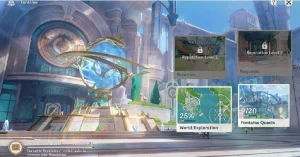The curtain opens.
In the center of the stage is a water city called Fontaine. The lights are soft and the water is rippling, like an unfolding ink painting.
Catherine’s voice came from behind the scenes, calm but with a hint of imperceptible majesty: “Traveler, your Fontaine daily commission has been opened.”
She did not appear on the stage, but her voice, like an invisible key, opened this drama day after day.
—
The traveler, the person who is always alone, slowly walked onto the stage. There was both confusion and determination in his eyes. He was facing a “task list”, and these four tasks were like four roles, waiting for him to perform.
Act 1: Help the researcher find the out-of-control device.
On one side of the stage, the researcher looked at the device floating in the water at a loss. The traveler approached and was silent. The water surface reflected the figures of the two people, flickering, like a silent conversation.
The researcher whispered: “This is the lifeline of Fontaine. If it cannot be repaired in time, the order of the entire city will be disrupted.”
The traveler nodded and sank into the water, darkness and clarity intertwined. Time seemed to stand still, with only the sound of water flowing and heartbeats. He fumbled, found the device, and reactivated it. The water surface returned to calm.
This scene ended, and the lights dimmed.
—
Scene 2: Submitting court documents.
The traveler held the documents and walked through the towering colonnade of the court. The stage lights changed, showing the solemnity and coldness of the corridor.
“The power of law,” a judge’s voice sounded from the side curtain, “Here, order must be maintained, otherwise, chaos will sweep everything.”
The traveler handed over the documents and accepted a silent trial.
The handing-in action seemed simple, but it was heavy. It was as if he had delivered his beliefs and responsibilities to the city together.
—
Act 3 and Act 4 are about driving away the escaped phantom and other Fontaine commissions.
Every mission is a play, and every completion is a spiritual transformation.
The lights focus on the traveler’s face, and his eyes are flashing with complex emotions.
There is fatigue and desire; there is loneliness and belonging.
—
After each act, Catherine’s voice sounded again: “The reputation is increased by one level.”
Reputation is the applause of the audience of this play, and the city’s affirmation of the traveler’s efforts.
But the traveler knows that behind this applause is the increase of responsibility and the superposition of expectations.
He did not come for applause, but to complete the unfinished proposition of this city.
—
A high tower gradually rose in the center of the stage, and the traveler climbed up.
He overlooked the water city, the lights were dim, and the water ripples were like a mirror.
He silently asked himself in his heart: “Who am I? Why am I here?”
The laws, reputation, and missions of this city, like an invisible net, trapped his freedom.
He struggled and broke free, but found that it was the fate he chose.
—
The curtain fell.
But this is not the end.
The traveler will continue his journey with the memory of Fontaine.
His story slowly unfolds in every daily commission.
It is a silent drama, a long monologue about responsibility, choice and freedom.

